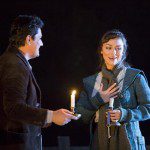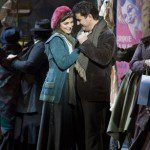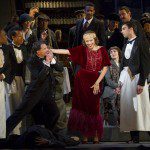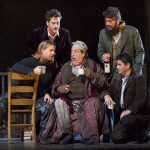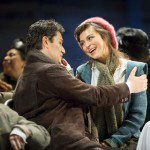‘La Boheme’: Puccini’s Passion for All
By • November 6, 2014 0 2360
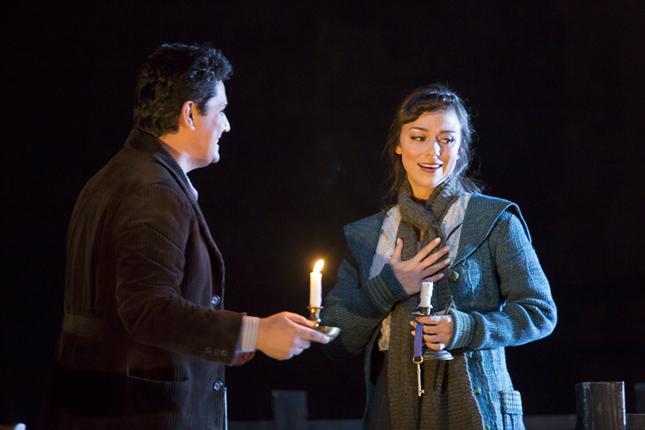
Giacomo Puccini’s 1896 opera “La Boheme” is — like “Carmen” or “Madame Butterfly” — one of the opera world’s old reliables, often performed, popular, somewhat like “Romeo and Juliet” or “Twelfth Night” in a Shakespeare repertoire. It’s the opera for people who don’t like opera, but perhaps more important, for people who do like opera, especially familiar ones.
It’s a stirringly romantic work, with familiar duets, arias, set pieces, with orchestral music that invites swooning and a plot that invites sniffling. Truth be told, no matter how much some might long for darker, edgier, more difficult work, “La Boheme” reaches across the aisles of a varied audience — young to old patrons — because it works.
That was the case for the Washington National Opera’s production, which had a stellar, young cast, whose members found their voices as the proceedings went along, with WNO music director Philippe Auguin conducting. It remains the same old story—although pushed forward into post-World War I Paris, so beloved by the Lost Generation and Woody Allen both. World War I seems to be in fashion these days—the brown helmets of the trenches were afoot in the Folger’s production of “Julius Caesar,” also.
But the characters are still the same young Bohemians, a group of four would-be writers, philosophers, composers, poets, starving to the point where Rodolfo, the young hero of the piece, throws his manuscript into a stove just to keep warm. It’s mad, and sad, and every now and then, they run off gladly, gaily to the Latin Quarter and to take in the festive atmosphere of outdoor dining in gay, or not so gay, Paree.
The romance(s) are always the key to the opera, but it’s also a kind of soaring, gorgeously composed opera about the Bohemians as a group—when they fall in love and out of love, the rest feel the resultant hurts, confusions and emotional earthquakes.
It takes its sweet time getting going, as Rodolfo (Albanian tenor Saimir Pirgu) meets the fragile, sweet Mimi (American soprano Corinne Winters), searching for a candlelight after the four Bohemian compadres have managed, however badly, to heat the high-ceilinged garret and win yet another battle with the landlord. Mimi is suffering from consumption and hasn’t very much life left in her, but Rodolfo warms her with his ardent courtship. Meanwhile, Marcello (American baritone John Chest) is in frustrating pursuit of the high-flying Musetta (American soprano Alyson Cambridge), who attracts rich suitors like a magnet.
The lovers—but not the friends—come together, split up, the two swains singing achingly of their predicaments. Eventually, as the winter snow falls beautifully on stage, they all gather together with Rodolfo, stricken with love and impending loss as he sees Mimi fading away. In that elongated scene leading to her passing — not as long as the “La Traviata” death scene — the group comes together, with Musetta showing her mettle, John Bloom, as Colline, coming forth with a full-throated and surprising solo, and both Pirgu and Winters finding their voices and their emotions in tandem. In their singing, their placement on the stage, the Bohemians become a group, gathering around the dying Mimi, offering gifts, succor, food and shared grief, not to mention beautiful music.
Most of the singers are new to the WNO—they sang with great clarity and strength after a slow start—and by the time Mimi’s hand dropped lifelessly, you could hear sniffling begin here and there, to the right of me, to the left of me and behind me.
It’s almost useless to argue with an opera like this. It has Puccini’s natural emotional and musical will rolling over everything, Italian temperament warming up the cold rooms, and freezing hands and grieving hearts.
“La Boheme” is double cast. Check the Kennedy Center and WNO website for casts and times. It runs through Nov. 15.
- Saimir Pirgu as Rodolfo and Corinne Winters as Mimì. | Scott Suchman for WNO.
- Yelp
- Yelp
- Yelp
- Yelp
- Yelp
- Yelp

